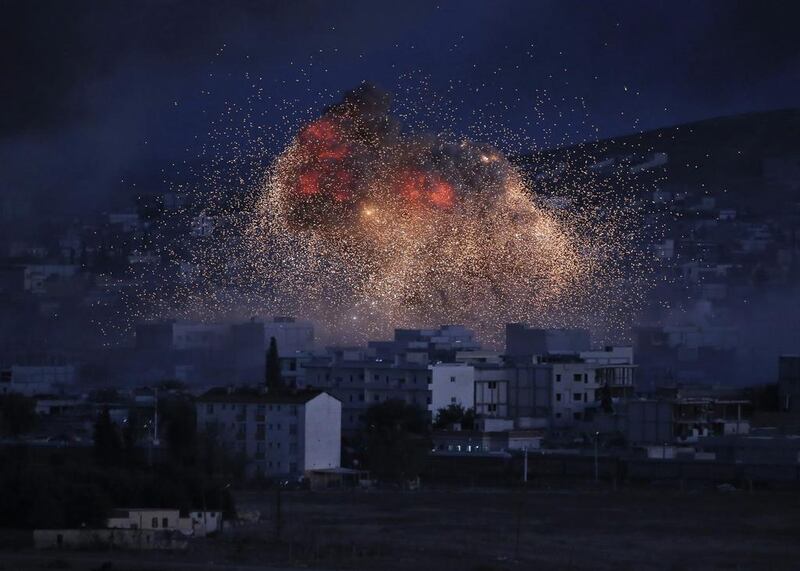Not a day passes without a western citizen travelling either to Syria or Iraq to join ISIL. The number of recruits is soaring in dramatic fashion in the UK, France, Canada and the US just to name a few countries. Recently, it was estimated that about 1,600 UK citizens have joined ISIL making it the largest European contingent, surpassing France. How does the West reverse this worrisome trend?
First and foremost, one has to look at the two tipping points that got us here.
The first one took place in August 2013 after the Ghouta chemical attack conducted by Syrian president Bashar Al Assad’s forces. This crossed what US president Barack Obama called his “red line” but was met by a disgraceful muteness both within the administration and also across the pond in the UK, whose parliament lamentably voted against military intervention in Syria. The only country that was sanguine about punishing Mr Al Assad harshly were the French. They had their fighter jets on the tarmac ready for take off but cancelled the operation when the US told them they were on their own. This western inaction was the ideal propaganda and recruitment tool for anti-Assad jihadists in Syria. Their rationale for convincing young people in the West was simple: “Your government is supposedly defending human rights but when it comes to saving Muslim lives, it does not care. We need your help, come join us.” The message worked like a charm and recruiting numbers in western Europe skyrocketed. Right there and then, the West lost its first major battle against ISIL.
The big defeat took place the following year, in August 2014 when Mr Obama decided to intervene militarily against ISIL in Iraq. Until that fateful intervention the West could hide behind the argument that it did not want to be part of a new war in the Muslim world after Afghanistan and Iraq. But how could one make the case that Iraq was morally a higher priority than a “civil” war in Syria that has killed 200,000 people and displaced nearly four million people to neighbouring countries?
Getting western countries to join the coalition against ISIL was a walk in the park and the British parliament voted overwhelmingly for the military operation in Iraq after having voted against Syria the year before. This was the second gift to ISIL’s propaganda machine. In other words, a Sunni life is worth nothing compared to a Shia one.
The West comes rushing to help the Shias and Iran, in particular, while it leaves Sunni children to die at the hands of a bloodthirsty dictator in Syria. Actions speak louder than words and the West offered no counter-narrative to shoot down the ISIL logic. That is why the recruitment of western citizens for Syria and Iraq to join ISIL has accelerated again since last summer and it seems as if it will not stop.
Worryingly, the stakes are higher now as the West is not dealing only with the recruits going abroad but also the ones staying home and potentially planning attacks against their own country.
This was the case with the Charlie Hebdo killings and the attack on the kosher store in Paris. Indeed, the likelihood of a home-grown attack in the West has risen tenfold since the coalition started targeting ISIL in Iraq last year. Therefore, western security services are eager for anything that will help them but unfortunately, western governments are at a loss when it comes to devising an effective strategy.
But if an answer is to be found, one has to look where it all started: Syria. Every Assad regime chemical attack on Syrian civilians that is left unanswered by the West helps ISIL and sends them more western recruits. Until when are we going to let Mr Al Assad use chemical bombs? Didn’t the international community sign an agreement to take all of these weapons away from him?
The only action that would help reverse the West’s lack of credibility with its Muslim population is to go hard after the Assad regime.
France has been convinced of this course of action and it was joined in this view at one point by former US defence secretary Chuck Hagel. He was fired for, among other things, holding this view. Sadly the Obama administration has actually been getting closer to Mr Al Assad of late and this is a recipe for disaster that will only worsen the situation.
Mr Al Assad recently said: “My goal has never been to remain president, neither before, during, or after the crisis”.
So if he is asking for it himself, why is the West not helping him step down from office? It would help the West to help itself.
Olivier Guitta is the Managing Director of GlobalStrat, a security and geopolitical risk consulting firm
On Twitter: @OlivierGuitta





